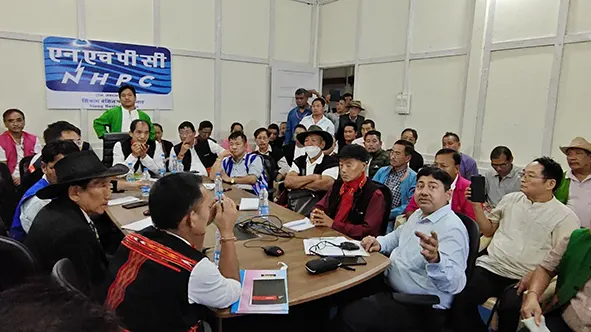PASIGHAT, 5 Oct: The National Hydroelectric Power Corporation (NHPC) Ltd held a consultative discussion on the proposed Siang Upper Multipurpose Project (SUMP) with delegations of the Adi Bane Kebang (ABK) and the Siang Indigenous Farmers’ Forum (SIFF) at the NHPC office complex here in East Siang district on Saturday.
The meeting was attended by ABK president Tanon Tatak, along with other executive members, SIFF president Amok Padung, and SIFF secretary Likeng Libang, along with stakeholders from Siang and Upper Siang districts. SUMP state nodal officer Atek Miyuand Riga Assistant Commissioner Philip Jerang were also present.
The NHPC’s Siang Lower Project General Manager (Civil) Amar Nath Jha briefed the participants on the key aspects of the SUMP, highlighting the strategic and water security significance of the project, which has been declared a national project by the Government of India.
Jha explained that the SUMP would be designed to ensure flood moderation, water security, and clean hydropower generation, while also driving regional growth through improved infrastructure, local employment, and community welfare initiatives.
He noted that the project would regulate the river flow, mitigate flood risks, and contribute to long-term ecological and social resilience of the Siang region and its people.
“The SUMP is not just about generating power; it’s about securing the future of Siang valley,” Jha said. “Through open dialogue and collaboration with local communities, we aim to create a project that strengthens regional development while preserving the unique cultural and environmental heritage of Arunachal Pradesh.”
ABK president Tatak and other members raised several questions to clarify their doubts over the project, to which the NHPC GM responded with detailed explanations. Tatak proposed holding a consultative meeting with the project-affected families, followed by another meeting with the state government and the NHPC.
The NHPC GM urged the ABK to support the preparation of the pre-feasibility report and to help raise awareness at the grassroots level about the importance and necessity of the SUMP.
It was also emphasised that the preparation of the detailed project report and related studies, such as the environmental impact assessment, environmental management plan, social impact assessment, land acquisition, and resettlement & rehabilitation plan, would involve consultations with stakeholders at every stage.
“The discussion was marked by openness, mutual respect, and constructive exchange of ideas,” the NHPC informed in a release, adding that the delegates actively raised queries, which were addressed by Jha with detailed explanations.
The NHPC reiterated its commitment to work closely with community organisations to ensure that the SUMP delivers sustainable benefits to the region while upholding environmental and social safeguards.



